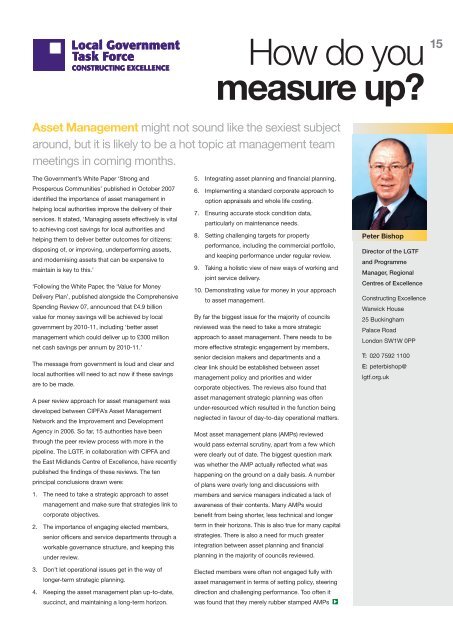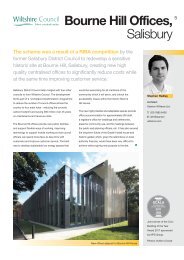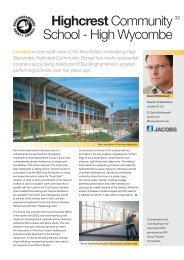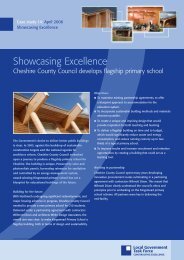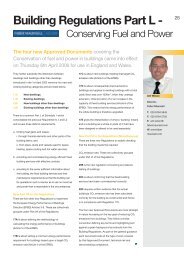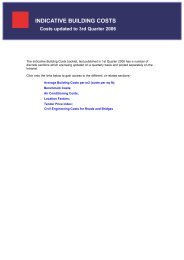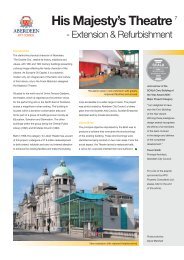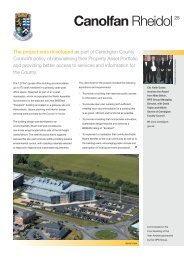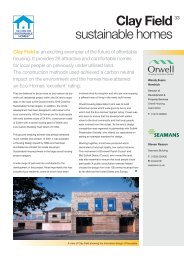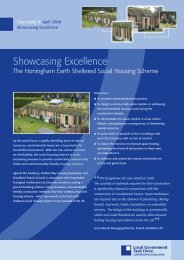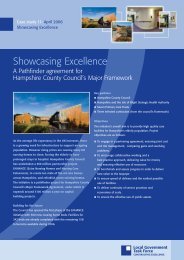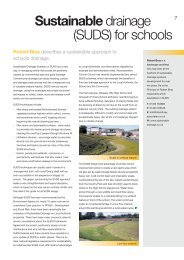How do you measure up? - Public Architecture
How do you measure up? - Public Architecture
How do you measure up? - Public Architecture
Create successful ePaper yourself
Turn your PDF publications into a flip-book with our unique Google optimized e-Paper software.
<strong>How</strong> <strong>do</strong> <strong>you</strong><br />
<strong>measure</strong> <strong>up</strong>?<br />
15<br />
Asset Management might not sound like the sexiest subject<br />
around, but it is likely to be a hot topic at management team<br />
meetings in coming months.<br />
The Government’s White Paper ‘Strong and<br />
Prosperous Communities’ published in October 2007<br />
identified the importance of asset management in<br />
helping local authorities improve the delivery of their<br />
services. It stated, ‘Managing assets effectively is vital<br />
to achieving cost savings for local authorities and<br />
helping them to deliver better outcomes for citizens:<br />
disposing of, or improving, underperforming assets,<br />
and modernising assets that can be expensive to<br />
maintain is key to this.’<br />
‘Following the White Paper, the ‘Value for Money<br />
Delivery Plan’, published alongside the Comprehensive<br />
Spending Review 07, announced that £4.9 billion<br />
value for money savings will be achieved by local<br />
government by 2010-11, including ‘better asset<br />
management which could deliver <strong>up</strong> to £300 million<br />
net cash savings per annum by 2010-11.’<br />
The message from government is loud and clear and<br />
local authorities will need to act now if these savings<br />
are to be made.<br />
A peer review approach for asset management was<br />
developed between CIPFA’s Asset Management<br />
Network and the Improvement and Development<br />
Agency in 2006. So far, 15 authorities have been<br />
through the peer review process with more in the<br />
pipeline. The LGTF, in collaboration with CIPFA and<br />
the East Midlands Centre of Excellence, have recently<br />
published the findings of these reviews. The ten<br />
principal conclusions drawn were:<br />
1. The need to take a strategic approach to asset<br />
management and make sure that strategies link to<br />
corporate objectives.<br />
2. The importance of engaging elected members,<br />
senior officers and service departments through a<br />
workable governance structure, and keeping this<br />
under review.<br />
3. Don’t let operational issues get in the way of<br />
longer-term strategic planning.<br />
4. Keeping the asset management plan <strong>up</strong>-to-date,<br />
succinct, and maintaining a long-term horizon.<br />
5. Integrating asset planning and financial planning.<br />
6. Implementing a standard corporate approach to<br />
option appraisals and whole life costing.<br />
7. Ensuring accurate stock condition data,<br />
particularly on maintenance needs.<br />
8. Setting challenging targets for property<br />
performance, including the commercial portfolio,<br />
and keeping performance under regular review.<br />
9. Taking a holistic view of new ways of working and<br />
joint service delivery.<br />
10. Demonstrating value for money in <strong>you</strong>r approach<br />
to asset management.<br />
By far the biggest issue for the majority of councils<br />
reviewed was the need to take a more strategic<br />
approach to asset management. There needs to be<br />
more effective strategic engagement by members,<br />
senior decision makers and departments and a<br />
clear link should be established between asset<br />
management policy and priorities and wider<br />
corporate objectives. The reviews also found that<br />
asset management strategic planning was often<br />
under-resourced which resulted in the function being<br />
neglected in favour of day-to-day operational matters.<br />
Most asset management plans (AMPs) reviewed<br />
would pass external scrutiny, apart from a few which<br />
were clearly out of date. The biggest question mark<br />
was whether the AMP actually reflected what was<br />
happening on the ground on a daily basis. A number<br />
of plans were overly long and discussions with<br />
members and service managers indicated a lack of<br />
awareness of their contents. Many AMPs would<br />
benefit from being shorter, less technical and longer<br />
term in their horizons. This is also true for many capital<br />
strategies. There is also a need for much greater<br />
integration between asset planning and financial<br />
planning in the majority of councils reviewed.<br />
Elected members were often not engaged fully with<br />
asset management in terms of setting policy, steering<br />
direction and challenging performance. Too often it<br />
was found that they merely rubber stamped AMPs<br />
Peter Bishop<br />
Director of the LGTF<br />
and Programme<br />
Manager, Regional<br />
Centres of Excellence<br />
Constructing Excellence<br />
Warwick House<br />
25 Buckingham<br />
Palace Road<br />
Lon<strong>do</strong>n SW1W 0PP<br />
T: 020 7592 1100<br />
E: peterbishop@<br />
lgtf.org.uk
16 <strong>How</strong> <strong>do</strong> <strong>you</strong> <strong>measure</strong> <strong>up</strong>?<br />
“To be effective a<br />
corporate property<br />
gro<strong>up</strong> should meet<br />
on a regular basis<br />
and have full<br />
engagement at<br />
a suitable level<br />
from all service<br />
departments and<br />
key s<strong>up</strong>porting<br />
areas.”<br />
The Knowledge<br />
Base articles have<br />
more information<br />
on asset<br />
management issues.<br />
and other strategies rather than getting fully<br />
involved in the strategic asset management process.<br />
Most local authorities have a portfolio holder in place.<br />
Some, however, are not fully engaged in property<br />
matters because they have many other responsibilities<br />
or they concentrate on a specific area of asset<br />
management, such as the commercial estate, to the<br />
neglect of the bigger picture.<br />
To be effective a corporate property gro<strong>up</strong> should<br />
meet on a regular basis and have full engagement at<br />
a suitable level from all service departments and key<br />
s<strong>up</strong>porting areas. The reviews found in practice that<br />
these gro<strong>up</strong>s often start off with good intentions but<br />
attendance dwindles because of competing priorities.<br />
Sometimes service departments get around this by<br />
sending more junior staff without the authority to make<br />
decisions and who often just report back proceedings.<br />
The Corporate Property Officer (CPO) has a pivotal<br />
role within an organisation, acting as the focal point<br />
for asset management. It is important that the person<br />
fulfilling this role is senior enough to be influential but<br />
not so senior that they have many other roles to<br />
perform. In most peer reviews, the CPO seemed to be<br />
positioned at the right level although in a few cases<br />
this was at director level where they held a number of<br />
other responsibilities that had the potential to dilute<br />
the effectiveness of the CPO role.<br />
In the majority of authorities the strategic property<br />
function is an area that is under-resourced. Far too<br />
often the reviews found that the reaction to day-to-day<br />
operational issues hinders effective longer term<br />
strategic planning. For smaller authorities it is often<br />
not practical to have a separate section dealing with<br />
strategic asset planning, but there still needs to<br />
be a clear demarcation of roles or time allocated to<br />
strategic and operational issues.<br />
While the majority of councils could point to examples<br />
of option appraisal and some whole life costing on<br />
major schemes, little evidence was found of corporate<br />
approaches to these. Most councils would benefit<br />
from developing standard approaches including<br />
training for staff, members and other stakeholders.<br />
‘Cost in use’ information should also be utilised more<br />
effectively to s<strong>up</strong>port planning. Little evidence was<br />
found of such information being used in either option<br />
appraisal or whole life analysis.<br />
Most councils carry out a rolling programme of<br />
property surveys to ensure 100% coverage over four<br />
or five year periods. <strong>How</strong>ever, recent surveys carried<br />
out by some councils indicated that their historic<br />
information was underestimated and their estate was<br />
in a worse condition than they thought. This was often<br />
because the latest on-site surveys replaced original<br />
desktop exercises.<br />
Most authorities have reasonable approaches to<br />
conducting other surveys such as asbestos and health<br />
and safety, although there were a few examples where<br />
these were not being carried out as effectively as they<br />
should be.<br />
It is fair to conclude that most councils were ‘fire<br />
fighting’ their backlog requirements without strategic<br />
plans in place to reduce maintenance figures.<br />
Anec<strong>do</strong>tal evidence points to a picture of an<br />
increasing maintenance requirement as programmes<br />
for maintenance are often under-resourced. In a<br />
number of councils, decision makers were often not<br />
aware of the total amount of maintenance and, if they<br />
were, it was a historic figure that was less than the<br />
true amount.<br />
Local authority assets offer huge potential for new<br />
ways of working and service delivery that will benefit<br />
staff and citizens alike. But this potential will only be<br />
fully realised if authorities focus less on immediate<br />
operational matters and <strong>do</strong> more to embed a strategic,<br />
performance driven approach to asset management.<br />
For more details, or a copy<br />
of the full report please visit:<br />
www.communities.gov.uk/<br />
publications/localgovernment/<br />
strongprosperous<br />
For further information<br />
on asset management,<br />
visit www.ipfproperty.net and<br />
www.publicsectorassetmanagement.com<br />
w w w. p u b l i c a r c h i t e c t u r e . c o . u k<br />
information and technology for construction & architecture in the public sector


